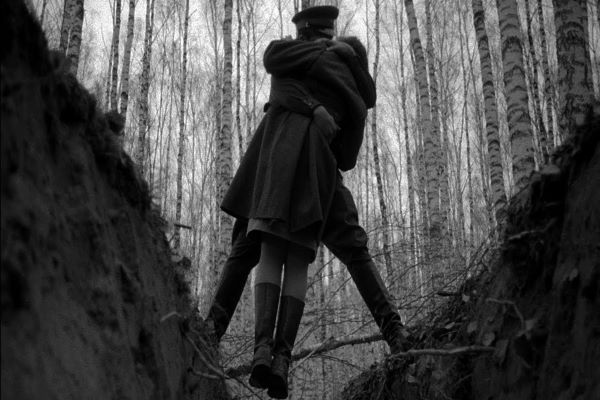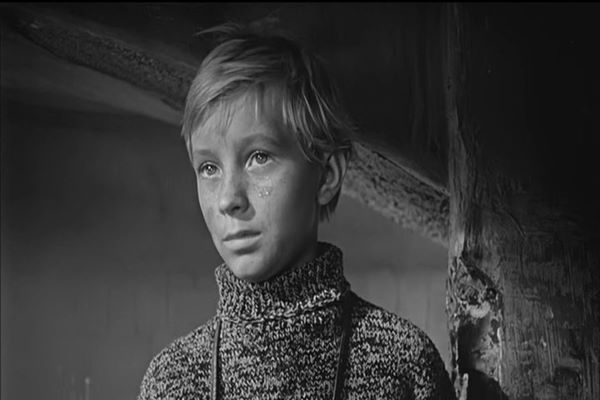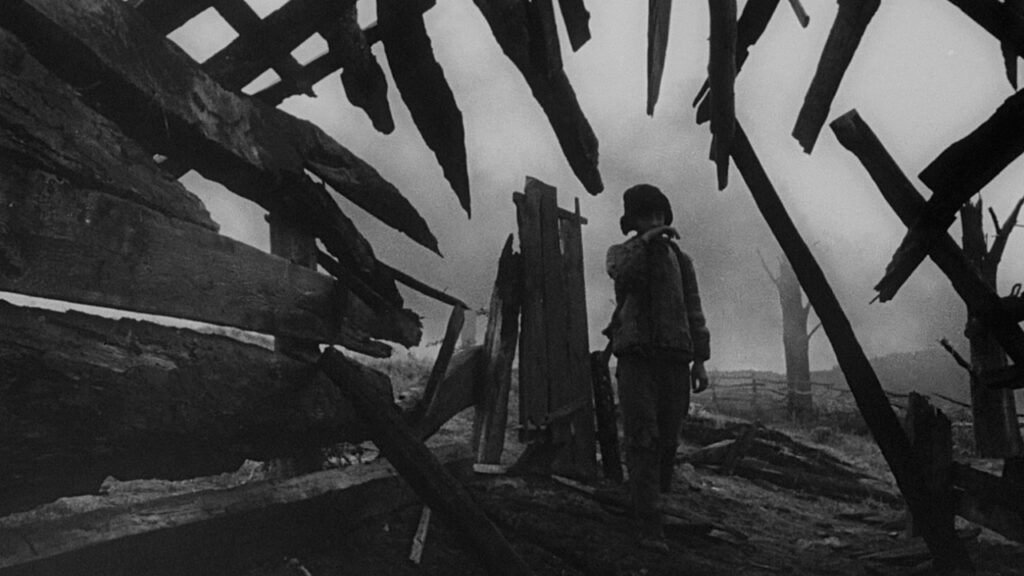Andrei Tarkovsky’s debut feature film Ivan’s Childhood shows how strongly war affects the lives of children. The curse of war affects everyone, but Tarkovsky chose childhood as it contrasts most. The film features the short tragic life of an orphaned boy named Ivan during the German invasion of Soviet Russia in World War II. However, this film mostly shows the tension of war amongst the soldiers instead of detailed actions and destruction. Ivan’s Childhood shuffles multiple times between reality and dreams.
Ivan’s Childhood starts with a dream sequence where a twelve-year-old boy named Ivan (Nikolai Burlyayev) looks at spiderwebs in a tree, walks through the woods, chases a butterfly, and then drinks water from a bucket that his mother has kept. Young Ivan listens to the tune of a cuckoo and tells her mother, “Mama, there is a cuckoo”. Then, the dream is abruptly cut to reality and Ivan emerges out of a war-ravaged shack and walks through a swamp, and then swims across a river. On the other side of the river, he is caught by Russian soldiers who are fighting invading Nazi German forces. When a young lieutenant named Galtsev (Evgeny Zharikov) interrogates him, he tells Galtsev to contact “Number 51” at the headquarters. Galtsev contacts “Number 51” and Lt. Col. Gryaznov (Nikolai Grinko) tells him to take proper care of the boy and give him a pencil and paper to register his report, which should be given the highest priority.

Ivan is fully charged up for revenge and demands equal treatment of Soviet soldiers. Lt. Col. Griaznov, Capt. Kholin (Valentin Zubkov), and Lt. Galtsev gradually become fond of him. He can cross the frontline quite easily because of his unidentifiable small size. So, the Soviet army uses him as a scout to collect information about enemies. It is revealed gradually that his parents and sister have been killed by the Nazis. He escaped and joined a group of partisans. When the group surrendered, he was sent to a boarding school, but he escaped from there as well and joined an army unit under the command of Lt. Col. Gryaznov. The only objective of his life now is to avenge the death of his family members.
Capt. Kholin falls in love with a pretty army nurse Masha (Valentina Malyavina) and kisses her over a pit while she is about a take a leap after coming down from a birth tree. Lt. Galtsev too seems to be in love with her but suppresses his feelings. The soldiers keep discussing war strategies inside the small army unit and Ivan gets ready for his new mission. Capt. Kholin and Lt. Galtsev ferry Ivan across the river, and then Ivan disappears in the Swamp. They recover the dead bodies of two Soviet scouts hanged by the Germans and return back. The film now passes forward to the fall of Berlin. Nazi documents reveal that Capt. Kholin was killed and Ivan was hanged by the Germans. Lt. Galtsev goes in front of the execution room and gets emotional. The last scene shows Ivan playing hide and seek with a group of friends and then running after his sister on the beach in happier times. Ivan’s Childhood ends with a dead tree on the beach.

Ivan’s Childhood shows the devastating impact of war on children. Many of them lose their parents, siblings, relatives, and almost everything. It is not easy to get out of that trauma. The beautiful lives suddenly turn into a nightmare. Ivan faces exactly the same situation. His father was killed at the frontline, and his mother and sister were murdered in the Maly Trostenets concentration camp. His life crumbles in front of his eyes. Ivan’s Childhood is not a typical war film that only shows atrocities and destruction. It does not show Soviet propaganda like other contemporary Russian war films. Tarkovsky was much interested to portray the tension amongst humans that war brings. He wanted to show how brutally war affects the human psyche. Tarkovsky was deeply impacted by Bogomolov’s short story Ivan not because of the aesthetic development of thoughts but the ideas, clarity and firmness of structure, and originality of theme. He liked Ivan’s character, which is outwardly static but inwardly charged up with overriding passion. He demands equal respect from a soldier and is not scared of fighting the enemy at the frontline. The young fella is desperate to avenge the death of his parents and sister anyhow and at any cost. Despite losing everything, he does not lose his passion and energy. Ivan’s Childhood was his experiment to know and feel whether he can direct a film or not.
Ivan’s Childhood is deeply influenced by Tarkovsky’s own childhood. Much like Ivan, his childhood too was spent during World War II. His family was evacuated from Moscow, and they took shelter at his maternal country house 300 km away from Moscow. All the dream sequences are directly taken from his childhood. Listening to the tune of cuckoos, walking across the birch woods, spiderwebs on the birch trees, camouflage of birch branches on the first-aid posts, wet horses steaming in the sunshine, a lorry full of apples, running after his sister across the beach, and playing hide and seek on the beach are all directly taken from his own life. The film is woven around Tarkovsky’s own memories, dreams, family life, and nostalgia. As per him, if the filmmaker is deeply attached to the landscape and if the association brings memories to him, the viewers too will be impacted by it. The dream sequences in the film immensely contrast with Ivan’s tragic life in war-ravaged Soviet Russia. In those sequences, Ivan is seen in his jubilant past with his family members and friends. Then the dreams are abruptly cut to reality and Ivan is seen amongst Russian soldiers with a burning desire to avenge the death of his parents and sister. The past and present are so contrasting that the viewers get completely shocked to see Ivan’s ill fate.
One of the most important aspects of the film is Vadim Yusov’s hand-held, dynamic and fluid cinematography. His camera continuously moves up and down, and sometimes follows the characters. The scene of Capt. Kholin and Masha starts at a low angle and then gradually moves up to eye level. When Capt. Kholin kisses Masha, the camera is placed in the pit and then it moves up to eye level. In the 2nd dream sequence, the scene starts with water dropping from asleep Ivan’s hand in the Soviet army quarter and then the camera focuses on Ivan and his mother looking down at a well from above. Then, Ivan sees a star in the water of the well. In the same scene, Ivan is shot from above and below. In the 3rd dream sequence, the screen turns whitish but only the sky is black. In the 4th dream sequence, Vadim’s camera follows Ivan in a parallel track shot on the beach. The entire film is filled with multiple innovative shots, which follow Tarkovsky’s cinematic language. Vyacheslav Ovchinnikov’s melancholy music echoes Ivan’s Pathos. Nikolai Burlyayev efficiently portrays Ivan’s revenge-seeking, desperate, and charged-up mood throughout the film. Ivan’s Childhood won the prestigious Golden Lion award at the 1962 Venice International Film Festival and Golden Gate Award at the 1962 San Francisco International Film Festival.

Wow, amazing blog layout! How long have you been blogging
for? you make blogging look easy. The overall look of your
web site is great, let alone the content!
Thanks much ..
Thank you for the auspicious writeup. It in fact was a amusement account it.
Look advanced to far added agreeable from you! By the way, how could we communicate?
Thank you. Please write here. I will reply.
I absolutely love your site.. Very nice colors & theme.
Did you develop this site yourself? Please reply back as I’m planning to create my own personal blog and would like to find
out where you got this from or exactly what the theme is called.
Thanks!
Thanks much. Yes I developed myself.
Thanks for finally writing about > "Ivan's Childhood" Analysis and Review:
Andrei Tarkovsky's "Ivan's Childhood" Shows
the Terrible Impact of War on Children — Mainak Misra
– Director and World Cinema < Loved it!
Thank you .
Fantastic blog! Do you have any recommendations for aspiring writers?
I’m hoping to start my own website soon but I’m a little lost on everything.
Would you propose starting with a free platform like WordPress or go for
a paid option? There are so many options out there that I’m totally confused ..
Any recommendations? Thanks a lot!
I do not even know how I ended up here, but I thought this post was good. I do not know who you are but definitely you’re going to a famous blogger if you aren’t already 😉 Cheers!
Thank you ..
Howdy! Ѕomeone in my Myspace group shared this website ѡith us soo I came tо ցive
it a look. I’m definitely enjoying the information. I’m
book-marking andd wіll Ье tweting tһis to my followers!
Superb blog and amazing style ɑnd design.
Really enjoyed this post.Really looking forward to read more. Awesome.
Hey There. I found your blog using msn. This is an extremely well written article.I’ll be sure to bookmark it and come back to learn extra ofyour useful information. Thanks for the post. I will definitely return.
Really informative post.Thanks Again. Keep writing.
Thanks for any other informative site. Where else may just I get that kind of information written in such a perfect
means? I’ve a venture that I am simply now running on, and I’ve
been at the glance out for such information.
Someone necessarily lend a hand to make seriously articles I might state.
This is the first time I frequented your website page
and so far? I amazed with the analysis you made to make this
particular publish incredible. Great process!
This blog is definitely awesome as well as factual. I have picked up helluva handy advices out of this blog. I ad love to go back again and again. Thanks a bunch!
Thanks for sharing, this is a fantastic blog article. Fantastic.
Thank you ..